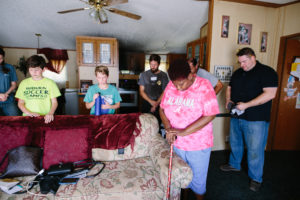written by Antione Harvis
Neh. 9:1-4
1 Now in the twenty and fourth day of this month the children of Israel were assembled with fasting, and with sackclothes, and earth upon them. 2 And the seed of Israel separated themselves from all strangers, and stood and confessed their sins, and the iniquities of their fathers. 3 And they stood up in their place, and read in the book of the law of the LORD their God [one] fourth part of the day; and [another] fourth part they confessed, and worshipped the LORD their God. 4 Then stood up upon the stairs, of the Levites, Jeshua, and Bani, Kadmiel, Shebaniah, Bunni, Sherebiah, Bani, [and] Chenani, and cried with a loud voice unto the LORD their God.
The children of Israel were broken. They had been humbled by the consequences of the actions of those that had come before them. They were fasting, in sackcloth. They separated themselves and stood and confessed their sins. They spent half the day reciting the book of the law, confessing their sin and worshipping God. They were confessing sin yet were not stuck in the lowness of sin but entered into the joy of worshipping God. They remembered the goodness of the Lord but also their fathers’ sin amidst such blessing
1) Have you ever had a feeling of brokenness or remorse for the wrong you’ve done toward God?
2) If so, what was your response or what did you do as a result of this feeling?
As believers, an acceptance of this brokenness is necessary. We must be stripped from the confidence we have in our own ability to somehow attain righteousness or a good report in the eyes of God. As we break from self and begin to depend on and take our identity from the Lord, we are sanctified (set apart) from our old selves and the mindset of the carnal world. Our confession is not just reciting our shortcomings, but be thankful because he has forgiven us and freed us from the sin nature “once for all” (Rom 6:10). The Lord has written his law into our hearts and in our minds (Heb. 10:16). His law in us shows us our natural inadequacies but also encourages us because it is engrained in us and becomes one with us. This experience is what leads us into worship.
3) Think about a time you were broken, did that situation led you to greater worship?
Neh. 9:5-31
In verses 5 through 31, the writer is recounting how God had blessed Israel over and over again, but they continued in disobedience. For many years God showed patience to them, and because they did not listen they were given over to people of the lands that the Israelites should have been inhabiting. Regardless of all that, God still continued to show great mercy and grace to Israel.
4) How much could you come up with if you took the time to look at God’s blessing over the course of your life?
When we get to the place of brokenness, and begin to think of all that God has done and continues to do in our lives, we develop a gratefulness to God and begin to get insight into God’s goodness and his character.
Neh. 9:32-38
32 Now therefore, our God, the great, the mighty, and the terrible God, who keepest covenant and mercy, let not all the trouble seem little before thee, that hath come upon us, on our kings, on our princes, and on our priests, and on our prophets, and on our fathers, and on all thy people, since the time of the kings of Assyria unto this day. 33 Howbeit thou [art] just in all that is brought upon us; for thou hast done right, but we have done wickedly: 34 Neither have our kings, our princes, our priests, nor our fathers, kept thy law, nor hearkened unto thy commandments and thy testimonies, wherewith thou didst testify against them. 35 For they have not served thee in their kingdom, and in thy great goodness that thou gavest them, and in the large and fat land which thou gavest before them, neither turned they from their wicked works. 36 Behold, we [are] servants this day, and [for] the land that thou gavest unto our fathers to eat the fruit thereof and the good thereof, behold, we [are] servants in it: 37 And it yieldeth much increase unto the kings whom thou hast set over us because of our sins: also they have dominion over our bodies, and over our cattle, at their pleasure, and we [are] in great distress. 38 And because of all this we make a sure [covenant], and write [it]; and our princes, Levites, [and] priests, seal [unto it].
The last few verses present an appeal to God’s mercy, goodness, and lovingness. Although they knew they were not worthy of His goodness, their distress pushed them toward God with a unified and made up mind. We must embrace God’s goodness in order to receive His forgiveness, and subsequently His deliverance. Otherwise we think he is unloving and unforgiving like we are and we fall short of accepting his blessing in our lives.
6) What does God’s goodness mean to you? How has His goodness impacted your approach to Him?








